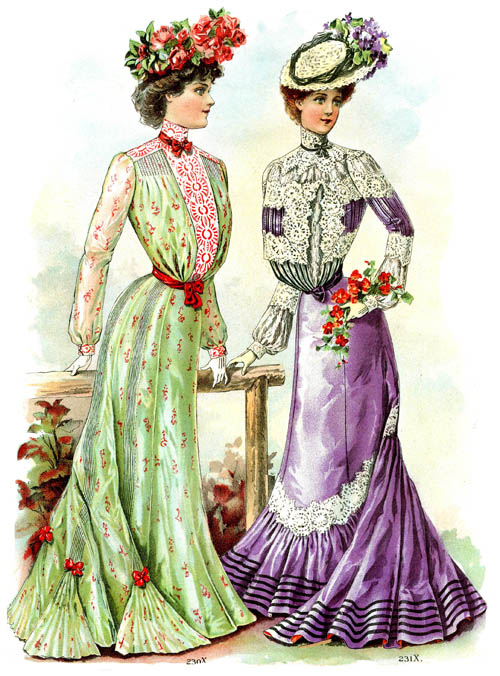|
Home > The Victorian Woman > More... > Women's Clubs & Organizations
- Committee Work in Women's Clubs, by Jenny June
(Demorest, 1879)
- Girls' Own Societies, by Dora Hope
(Girl's Own Paper, 1880)
- A variety of groups that a girl can form or join, including reading societies, needlework societies, essay clubs - even "early rising" societies for those who find it difficult to get up in the morning!
- The "Girls' Own" Club, by Dora Hope
(Girl's Own Paper, 1881)
- On a club to help train girls in domestic and spiritual matters.
- Our Cottage Gardening Society, by Letitia McClintock (Cassell's Family Magazine, 1881)
- About Mothers' Meetings, by Alice King
(Girl's Own Paper, 1882)
- Another type of club designed to train women in domestic and spiritual matters - "We think that, in general, story books, with good religious teaching in them, suit best..."
- The Girls' Friendly Society
(Girl's Own Paper, 1883)
- Originally organized to assist country girls employed in London.
- The Girls' Own Home, by the Countess of Aberdeen
(Girl's Own Paper, 1883)
- "If [a working girl] has no home to go to, will she not be likely to seek for change from the dreary round of work by reading the trashy literature that abounds, by resorting to dancing-rooms and theatres, where she had better never be seen, where she is in danger of losing all that is pure and true and high-minded, where she may form companionships which will prove fatal to her?" Seven "girls' homes" already existed at this point, and the Countess was encouraging the Girl's Own Paper to found another.
- The Y.W.C.A.
(Girl's Own Paper, 1883, 1887, 1888, 1889, 1890)
- Various articles on the purpose and activities of the YWCA, including its classes for women.
- Hyde House, by Anne Beale
(Girl's Own Paper, 1884)
- A home for working girls.
- The Ladies' Discussion Society
(Girl's Own Paper, 1884)
- "The 'good old days' are fortunately growing more and more distant, when it was thought a waste of time for a girl who had 'finished her education' to have a book in her hand, and the cheap and vacant occupation of needlework formed the staple of all feminine existence."
- Friends in Council: The Chiltern Club
(Girl's Own Paper, 1885)
- "Its object is the discussion of various questions of interest - literary, social, philosophical, political...The fact that women in the mixed company express their thoughts is the only feature in this Society that has any claim to novelty... [In other clubs] as a rule I believe men only speak, while women, if allowed to be present, listen in silence."
- Our Church Club, by Julia Dorr
(Century Magazine, 1885A)
- A country women's fortnightly meeting for reading and education.
- Our Shakespeare Society
(Girl's Own Paper, 1885)
- Three Social Evenings, by Anne Beale
(Girl's Own Paper, 1886)
- The author reports upon two evenings at the YWCA, and one at Welbeck House, a restaurant and hostelry for women.
- Certain Forms of Woman's Work for Women, by Helen Campbell
(Century Magazine, 1889B)
- A look at working conditions and the founding of the YWCA.
- The Club of the Future, by Jenny June
(Demorest, 1889)
- Subtitled "Men's and Women's Clubs, Their Possibilities and Prospects."
- Women's Clubs in London, by S.F.A. Caulfeild
(Girl's Own Paper, 1890)
- "...we may observe the increase of improvident marriages and those of the physically unsuitable, the many failures of financial enterprises, the deterioration of the value of land... Thus the daughters of the very elite of the untitled aristocracy are driven from home...to become the bread-earners for themselves and their families... an article like this demands such an introduction as showing the origin of the needs-be for women's clubs."
- Sloane Gardens House, by Anne Beale
(Girl's Own Paper, 1891)
- A Residential Club for Ladies, in London.
- The Women Who Do the Work, by Florence Lockwood
(Century Magazine, 1891A)
- A National Organization of Working Girls' Clubs.
- Magazine and Book Clubs, and How to Manage Them, by Dora de Blaquière
(Girl's Own Paper, 1892)
- The Story of a London Factory Girls' Club, by Mary Canney
(Girl's Own Paper, 1895)
- After-School Education in America, by Dora de Blaquière
(Girl's Own Paper, 1898)
- A look at women's "clubs" in America, and the education curricula these provided. ("After-school" means "after graduation.")
- Club and Salon, by Amelia Gere Mason
(Century Magazine, 1898B)
- Women's literary clubs and salons.
- How to Start and Manage a Mother's Meeting, by E.H. Pitcairn
(Girl's Own Paper, 1898)
- Tips on setting up "mothers' meetings" for the poorer women of a parish -- such a meeting generally includes some spiritual education, story reading, sewing instruction, and occasional "field trips."
- Good Cheer for Women Workers
(Girl's Own Paper, 1899)
- "A short sketch of 'Kent House,' the YWCA House for Students and Others" in London.
- Our Travel Club, and How We Manage It
(Girl's Own Paper, 1900)
- "We are supposed to...try to imagine we are a party going to travel in some foreign country," whereupon the various "committees" research routes, sights, art, culture, etc. and present the information to the club as a whole.
|
Visit Our Victorian Shop
for:
Books
Coloring Books
Beautiful Spiral Journals
Holiday Greeting Cards
|
|


 Discover thousands of Victorian images in our
Discover thousands of Victorian images in our